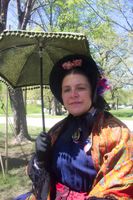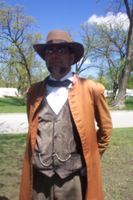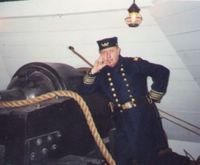
Captain Monoghan - 6th Louisiana
What role do you portray?
I am the captain of the 6th Louisiana Volunteer Infantry
What is your real name?
Robert Even
What do you do in real life?
I am a youth care worker, night monitor at a residential care facility.
How long have you been reenacting?
About five years now.
What is your role in your unit?
As a captain I make sure people in the unit maintain safety at all times. I designate rank, I command on the field, I make sure orders are followed. In camp I make sure they have proper passes, that everyone makes it to payroll, make sure everyone has the proper gear, make sure tents are up in a straight line conforming to regulations, and that everyone is behaving.
What is the history behind the person you portray?
Captain was an Irishman and an engineer. Rumor says he was somewhat of a gambler as well but not professionally. He put up a sign to recruit Irish members and ended up with two companies. They were assigned to Col. Isaac Seymour to form 6th Louisiana. Monoghan actually made it to the rank of Lieutenant Col. and actually commanded the 6th Louisiana. before he was killed
Why did you pick this role to portray?
My own heritage I am part Irish. I was looking for some one to portray that was Irish. My two nephews are also part of the unit and we have a member that is second generation American from Ireland. This unit was a perfect combination for us as an Irish Southern unit to explore and portray members of our heritage.
What did you do to prepare for this role?
Internet exploration comes in really handy. I have six books just on Louisiana units. And I found other books and just kept reading. Did research at libraries to find out what uniforms and flags were like. We talked to other units that portray units that are similar.
Drilling a lot, some people have military experience and some don't. Even so we have to drill a lot to become a well drilled and snap unit.
Where did you find your equipment?
Some of the uniforms we actually made. We go to sutlers for pre-made clothing and weapons. Sometimes you can get good deals. We try to be as authentic as we can. No plastic or anything like that.
What is your favorite question from a child?
My favorite is : "Do you really shoot at people?" It really is a here's your sign question but we try to be serious about answering that question. My answer is that no, we do not shoot live rounds at people. We use only the gunpowder to make the noise and smoke. Even that can be dangerous so you still do not want to point it directly at some one. You have to make sure there is nothing else in the barrel of the gun or it will fly out as if it were a bullet.
What is your favorite reenactment and why?
There is a lot of them. First you get the bug where you can see and feel things that would make a great battle scene. Then there is the fever is where you start working out strategies to place your men to advantage and if I were commanding I'd do it this way. Then there is the Addiction. That is when you love coming to events because it is a great stress reliever and you just cannot seem to get enough of the atmosphere. It takes me back in time. I think I was born in the wrong time period.
The very favorite I have done was not a reenactment but, a funeral for the crew of the Huntley.










